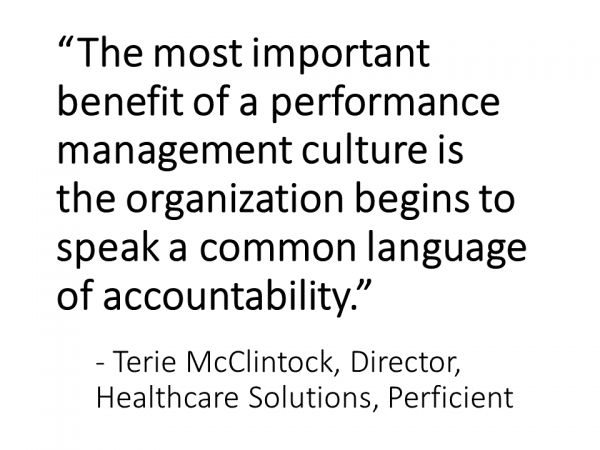Anticipating the hot topics at HIMSS can be a mind boggling experience. However, I can bet topics that revolve around the Triple Aim will be at the top of the list. Today, I sat down with Terie McClintock, MBA, Director, Healthcare Solutions, Perficient to talk about enterprise performance management and its importance in an ever-evolving healthcare industry.
 Terie has more than 25 years of experience in information systems management directing the acquisition, deployment and maintenance of technology platforms and applications. Terie is a healthcare strategist and subject matter expert across multiple domains and has directed several large-scale implementations of ERP software, enterprise-wide business intelligence and data management solutions. She has strong financial, capital planning and project management experience.
Terie has more than 25 years of experience in information systems management directing the acquisition, deployment and maintenance of technology platforms and applications. Terie is a healthcare strategist and subject matter expert across multiple domains and has directed several large-scale implementations of ERP software, enterprise-wide business intelligence and data management solutions. She has strong financial, capital planning and project management experience.
KATE: What are the benefits of enterprise performance management for healthcare providers?
TERIE: Performance monitoring within the hospital can be accomplished through strategic partnerships between finance and operations. Data-driven decision making has elevated the role of the hospital finance department from a back-office operational function to a more strategic, advisory one. Correlating financial and operational data to manage the margin can drive informed business decisions that support sound strategic and tactical planning and execution. As I work with clients over the past two years, I’m witnessing a shift that requires finance to transcend from the typical focus on aggregating data to a value added analytics team that could provide greater visibility into changes in variables and assumptions. I believe that the most important benefit of a performance management culture is that the organization begins to speak a common language of accountability and front line managers begin to understand the relationships between drivers and departmental workload leading to increased ownership of controlling these variables.
KATE: What are some of the challenges you are hearing in the industry in regards to performance management?
TERIE: Most providers are looking to measure productivity from both a revenue and an expense management perspective. We are working with several large healthcare systems on forecasting solutions to model and measure both provider and nursing productivity. For Providers, the focus is mostly on becoming more effective with forecasting in-patient and out-patient revenue that are linked to drivers and also assist to predict the associated expense. For nursing, hospitals are linking productivity to enterprise drivers, but the focus is more on minimizing and or optimizing overtime expense. The other emerging trend is that hospitals are getting serious about understanding fully burden margin (cost) and enterprise-wide data warehouses.
KATE: How have technologies such as the cloud impacted enterprise performance management?
TERIE: Cloud solutions are a perfect fit for a performance management platform because the Cloud enables healthcare entities of all sizes to deploy solutions for performance management. We are seeing an uptick in the amount of hospitals moving to the cloud for large scale performance management solutions. The subscription based licensing model can be treated as an operating expense and the cloud service also lowers the implementation fees (at a minimum for infrastructure related costs) taking the IT department out of the equation. This is manifesting in the market as opportunity to implement state-of-the-art driver-based forecasting solutions that either replace or complement existing on-premise budgeting applications.
KATE: How is patient-centered care impacting performance management?
TERIE: Hospitals are increasingly pressured to be transparent about pricing. Consumer choice is being impacted by the hospital’s ability to sustain some service lines. Telehealth solutions are also increasing patient satisfaction while enabling productivity gains for providers. One example is a solution that Perficient assisted Kaiser Permanente to deploy called “Self Service Symptom Checker”.
KATE: What IT investments can help organizations with enterprise performance management?
TERIE: Health systems should employ a portfolio of next-generation strategic decision support tools that enable their workers to continuously, accurately, and transparently engage stakeholders in the common mission to profitably evolve care delivery models. Next-generation tools will allow health systems to pragmatically and progressively adopt methodologies that effectively represent value-based constructs, like total cost of care across acute and ambulatory episodes of care, bundled service definitions, and population health performance measures, while leveraging today’s practices. “Traditional” decision support functions of cost accounting, budgeting, planning, forecasting, and workforce analytics must now be delivered as a single, integrated suite. This is necessary in order to harmonize data from clinical and operational systems and provide multiple, seamless, real-time lenses on the health system’s short- and long-term performance against the driving performance measures of value-based care. Stakeholders should also be equipped with short- and long-term predictive modeling insights into the impact of changing patient volume on costs and profitability. Such insights will support decisions on service-line growth and potential financial risk of multiple, simultaneously modeled contractual agreements across various payers.
Healthcare organizations that deploy an advanced, business-user configurable decision support solution such as the Perficient High-Performance Costing Expressway can avoid big bang investments and progressively harness targeted data sources to gain insight across the care continuum while leveraging evolving best practices for costing and performance management.
Want to learn more? Terie will be presenting and demonstrating the Perficient High-Performance Costing Expressway solution in the Population Health Knowledge Center – Kiosk 14106 on Wednesday, March 2 from 4-6 PM PT. Stop by to discuss how Perficient can help your organization with enterprise performance management. Add to calendar
If you can’t make it to this specific session, stop by the Perficient booth #2871.

